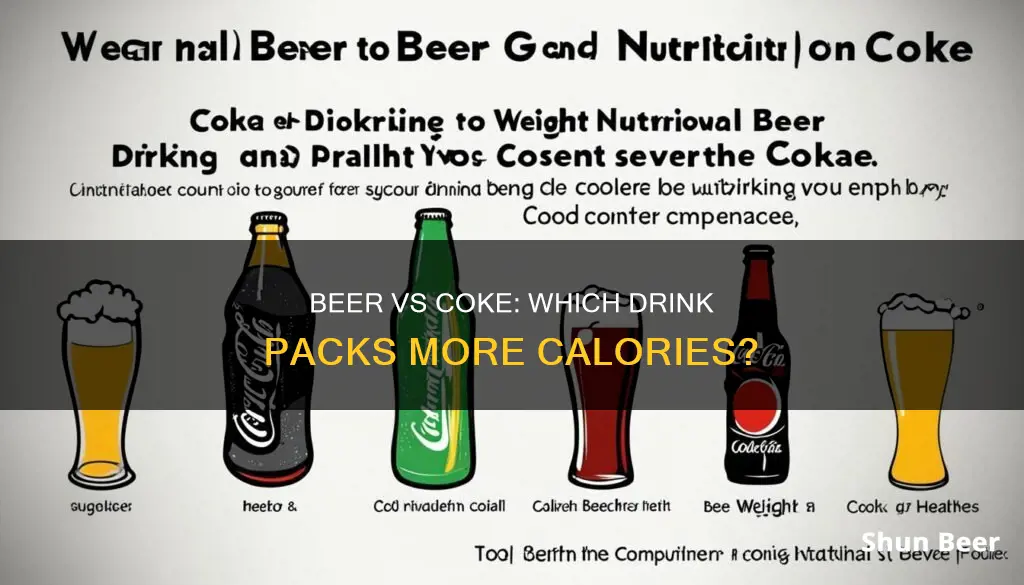
Beer or Coke—which has more calories? This is a question that has been asked by many, especially those who are conscious of their health and fitness. While some may assume that beer is the less healthy option, this is not necessarily the case. In fact, there are several factors to consider when comparing the two drinks, and it is important to understand the impact that each can have on the body. So, which one comes out on top when it comes to calorie content?
| Characteristics | Values |
|---|---|
| Calories | Beer has fewer calories than Coke. |
| Nutrition | Coke has no nutritional value, while beer contains trace amounts of protein, potassium, and antioxidants. |
| Sugar | Beer has no sugar, while Coke has 40 grams or more. |
| Glycemic Index | Coke has a glycemic index of around 90, while beer's is less than 15. |
| Health Effects | Regular Coke consumption can lead to weight gain and diabetes due to reduced insulin sensitivity. Excessive beer consumption can lead to health issues such as heart damage, high blood pressure, liver damage, and nutrient deficiencies. |
What You'll Learn
- Calories: Beer has fewer calories than Coke
- Nutrition: Coke has no nutritional value, while beer has trace vitamins and minerals
- Health: Excessive consumption of both can be detrimental to health
- Addiction: Both are addictive and can cause a release of endorphins in the brain
- Glycemic Index: Beer has a lower glycemic index and glycemic load than Coke

Calories: Beer has fewer calories than Coke
When it comes to calories, beer wins over Coke. A 12-ounce serving of beer typically contains around 150 calories, while the same amount of Coke will set you back about 160 calories. This may not seem like a significant difference, but it can add up if you're consuming multiple servings.
The reason for this calorie discrepancy lies in the sugar content of the two beverages. Beer contains zero grams of sugar, while a 12-ounce can of Coke can contain 40 grams or more. This high sugar content in Coke contributes to its higher calorie count.
It's worth noting that the calorie content can vary depending on the specific type of beer or Coke being consumed. For example, light beers tend to have even fewer calories, with some boasting about 50 fewer calories per 12-ounce serving when compared to regular Coke. On the other hand, some craft beers or specialty Cokes may have a higher calorie count due to their unique ingredients or added sugars.
While beer may have a slight edge over Coke in terms of calorie count, it's important to consider other factors when making a decision between the two. For example, the effects of alcohol in beer on the body are different from those of sugar in Coke. Alcohol is considered a toxin by the liver and can lead to significant strain when consumed in excess. Additionally, the health benefits associated with moderate alcohol consumption may not outweigh the risks of excessive drinking.
In summary, when it comes to calories, beer takes the lead with fewer calories and no sugar content. However, it's crucial to consider the overall health implications of both beverages and practice moderation in consumption to maintain a balanced and healthy lifestyle.
Calories in Beer: DockSider's Nutritional Breakdown
You may want to see also

Nutrition: Coke has no nutritional value, while beer has trace vitamins and minerals
When it comes to choosing between beer and Coke, it's important to consider not only the calorie content but also the nutritional value of each beverage. While both drinks have their pros and cons, the nutritional profiles of beer and Coke differ significantly.
Coke has no nutritional value; it provides empty calories without any vitamins or minerals. In contrast, beer contains trace amounts of vitamins and minerals, although not enough to provide significant micronutrients. Beer is typically fermented from cereals, which inherently contain small amounts of essential nutrients. These include B vitamins such as thiamin, riboflavin, niacin, vitamin B6, folate, and vitamin B12. Beer also contains minerals like selenium, potassium, and magnesium, although the specific types and amounts of minerals can vary depending on the brand and type of beer.
The presence of these vitamins and minerals in beer means that it can offer some health benefits when consumed in moderation. For example, moderate beer consumption has been linked to potential improvements in heart health and a reduced risk of certain diseases, including hypertension and diabetes. Additionally, beer has a lower glycemic load than Coke, which means it has a lesser impact on blood sugar levels and may be a better option for those managing their glycemic diet.
On the other hand, Coke's high sugar content—around 36.78 grams in a 12-ounce serving—contributes to its negative impact on weight and increases the risk of chronic health conditions. The excessive sugar in Coke can lead to significant weight gain and is particularly concerning for individuals at risk of developing type 2 diabetes. While beer also contributes to weight gain, especially when consumed in excess, its lower sugar content and the presence of vitamins and minerals make it a potentially more balanced option when consumed in moderation.
In summary, while both beer and Coke have their drawbacks, Coke provides no nutritional value, whereas beer contains trace amounts of vitamins and minerals that can have potential health benefits. However, it's important to remember that excessive consumption of either beverage can lead to negative health outcomes. Moderation is key to enjoying these drinks as part of a healthy lifestyle.
Calories in Shock Top's Seasonal Apple Beer
You may want to see also

Health: Excessive consumption of both can be detrimental to health
While beer and Coke may have a similar number of calories, excessive consumption of both can be detrimental to health. Beer and Coke are both considered toxins, with the former being treated as such by the liver. Moderate alcohol consumption has been linked to several social and health-related benefits, such as stimulating appetite and dietary intake in elderly individuals and lowering the risk of cardiovascular disease in middle-aged adults. However, excessive alcohol intake can lead to heart damage, fluid retention in the lungs, high blood pressure, oral cancers, liver damage, nutrient deficiencies, and the infamous "beer belly."
Coke, on the other hand, provides no nutritional value and is often consumed in larger quantities, leading to obesity and associated health risks. While beer may have a slight edge due to its trace amounts of vitamins, minerals, protein, and antioxidants, excessive consumption of either beverage can negatively impact health.
The glycemic index and load are important factors to consider when comparing beer and Coke. The glycemic index measures how quickly a food or beverage causes a rise in blood sugar levels, with higher values indicating a more rapid increase. Coke has a glycemic index of around 90, while beer falls below 15. However, the glycemic load, which takes into account both the quality and quantity of carbohydrates, is a more accurate indicator. Coke has a glycemic load of 15.0, while beer is half that at 7.5. This means that a diet focused on low glycemic loads can help maintain consistent blood sugar levels, reduce the risk of circulation disease, and lower the chances of developing diabetes.
Excessive consumption of either beverage can also increase the risk of certain diseases. While both are linked to liver and heart health issues, sugar-related deaths, such as those caused by diabetes, are a significant concern for Coke drinkers. On the other hand, alcohol-related deaths may result from drunk driving or other impaired judgment situations.
In conclusion, while beer may offer some slight nutritional advantages over Coke, excessive consumption of either beverage can have detrimental effects on health. Both beer and Coke should be consumed in moderation, with a maximum of one to two drinks per day for women and men, respectively, as per dietary guidelines.
Calorie Counting: Red Stripe Beer's Nutritional Breakdown
You may want to see also

Addiction: Both are addictive and can cause a release of endorphins in the brain
While beer and Coke differ in many ways, one commonality is that they can both be addictive. Alcohol and cocaine are both substances that can cause a release of endorphins in the brain, leading to potential addiction.
Endorphins are the body's natural opioids, released in response to pain or injury to reduce discomfort. They are also released during or after exercise, laughter, gambling, and other pleasurable activities. When it comes to alcohol, drinking causes a release of endorphins, resulting in a "buzz" or a pleasurable sensation. This is separate from the other intoxicating effects of alcohol, such as slurred speech and loss of balance. The "buzz" is what drinkers seek, and it is caused by the release of endorphins.
Similarly, cocaine is an extremely addictive stimulant that acts on the brain's reward system by flooding it with dopamine, creating an intense feeling of euphoria. This sense of euphoria is short-lived, and once it wears off, users often experience a craving for more. This craving can lead to a cycle of use and addiction that is challenging to break. The risk of addiction to cocaine increases with each use, and it can quickly turn into a habit that takes over an individual's life.
Both beer and Coke can be addictive substances, and their consumption can lead to the release of endorphins or other pleasurable chemicals in the brain. It is important to consume them in moderation and be aware of the potential risks associated with excessive use.
Low-Calorie IPAs: Are They Worth the Hype?
You may want to see also

Glycemic Index: Beer has a lower glycemic index and glycemic load than Coke
When it comes to choosing between beer and Coke, there are several factors to consider, including calorie content, nutritional value, and impact on weight. While both drinks have their pros and cons, understanding their compositions can help make more informed health decisions.
Glycemic Index
The glycemic index (GI) is a measure of how quickly certain foods or beverages, particularly those containing carbohydrates, raise blood sugar levels. Low GI drinks cause only a small rise in blood sugar levels, while high GI drinks can lead to spikes and crashes in energy levels, which can be detrimental to overall health.
Beer and Coke differ significantly in their glycemic indices and glycemic loads. Beer has a relatively low glycemic load of 7.5, while Coke has a higher glycemic load of 15.0. This means that beer poses a lower risk for blood sugar spikes compared to Coke. The high sugar content in Coke can cause significant fluctuations in blood glucose levels, which, over time, may contribute to insulin resistance and the development of type 2 diabetes. Therefore, when considering the impact on blood sugar levels, beer has a lower glycemic index and glycemic load than Coke.
Calorie Content
The calorie content of beer and Coke is another important consideration. On average, a 12-ounce serving of regular beer contains approximately 150 to 153 calories, while the same serving size of regular Coke typically has around 155 calories. However, it is worth noting that the calorie content can vary depending on the specific type of beer or Coke product.
Nutritional Value
Beer and Coke also differ significantly in their nutritional content. Beer is typically fermented from cereals and contains trace amounts of vitamins and minerals, including B vitamins such as thiamin, riboflavin, niacin, vitamin B-6, folate, and vitamin B-12. These vitamins play essential roles in energy production, nerve function, and DNA synthesis. In contrast, Coke is a sweetened, carbonated drink that offers little to no nutritional value in terms of vitamins or minerals. It is high in sugar, with approximately 36.78 grams of sugar per 12-ounce serving, which contributes to its negative impact on weight and health.
Impact on Weight
Both beer and Coke can contribute to weight gain if consumed in excessive amounts. Beer may act as an appetite stimulant, leading to increased caloric intake from additional food consumption. On the other hand, the high sugar content in Coke can directly lead to weight gain. However, it is important to note that the concept of "beer bellies" might be slightly misleading. While alcohol calories from beer can contribute to fat accumulation if consumed in large quantities, the sugary calories from Coke are also prone to contribute to weight gain, particularly around the abdominal area, which is often more dangerous for health.
In conclusion, while both beer and Coke have their advantages and disadvantages, beer generally has a lower glycemic index and glycemic load than Coke. This means that it has a lesser impact on blood sugar levels and may be a more balanced option for those concerned about managing their glycemic diet. However, it is crucial to consume either beverage in moderation and consider personal health conditions and dietary goals when making choices about what to drink.
Calories in Craft Beer: What's the Count?
You may want to see also
Frequently asked questions
Beer has fewer calories than Coke. A regular 12-ounce bottle of beer has 150 calories, while Coke has around 160 calories in the same amount.
Not necessarily. Both drinks are considered unhealthy and can lead to health issues if consumed in excess. Beer has some nutritional benefits, such as trace amounts of protein, potassium, and antioxidants, but it is still treated as a toxin by the liver. Coke, on the other hand, has no nutritional value and high sugar content.
It depends on various factors, including the quantity consumed, individual health, and lifestyle choices. Excessive consumption of either drink can lead to health issues, but the specific impact may vary from person to person. It is important to maintain a moderate level of consumption and be mindful of the potential risks associated with both beverages.







